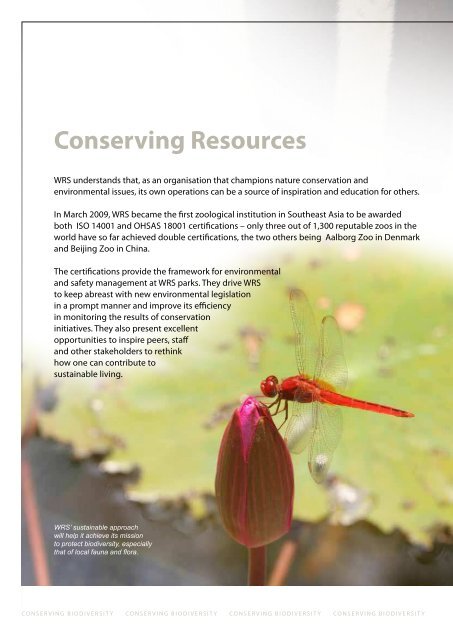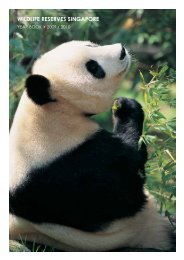Conserving Biodiversity - Wildlife Reserves Singapore
Conserving Biodiversity - Wildlife Reserves Singapore
Conserving Biodiversity - Wildlife Reserves Singapore
You also want an ePaper? Increase the reach of your titles
YUMPU automatically turns print PDFs into web optimized ePapers that Google loves.
<strong>Conserving</strong> Resources<br />
WRS understands that, as an organisation that champions nature conservation and<br />
environmental issues, its own operations can be a source of inspiration and education for others.<br />
In March 2009, WRS became the first zoological institution in Southeast Asia to be awarded<br />
both ISO 14001 and OHSAS 18001 certifications – only three out of 1,300 reputable zoos in the<br />
world have so far achieved double certifications, the two others being Aalborg Zoo in Denmark<br />
and Beijing Zoo in China.<br />
The certifications provide the framework for environmental<br />
and safety management at WRS parks. They drive WRS<br />
to keep abreast with new environmental legislation<br />
in a prompt manner and improve its efficiency<br />
in monitoring the results of conservation<br />
initiatives. They also present excellent<br />
opportunities to inspire peers, staff<br />
and other stakeholders to rethink<br />
how one can contribute to<br />
sustainable living.<br />
WRS’ sustainable approach<br />
will help it achieve its mission<br />
to protect biodiversity, especially<br />
that of local fauna and flora.<br />
ACHIEVING ENERGY EFFICIENCY<br />
To save energy and reduce carbon emissions, all air-conditioners are<br />
set at optimal 24˚C and those in the corporate office are automatically<br />
deactivated during lunchtime. Computers are installed with hibernation<br />
modes. On-site vehicles are powered by biofuel or electricity where<br />
possible.<br />
Lights and fans in public areas around the Parks function through motion<br />
sensors and pumps for waterfalls and fountains are set on timers. For new<br />
developments, structures are designed to optimise the use of natural light,<br />
which may be further directed to specific areas through the use of light<br />
tubes.<br />
Jurong Bird Park’s latest attraction, Birdz of Play features green roofs and<br />
green vertical walls, features that are to be included in all WRS parks, as and<br />
when opportunities arise. Green roofs and walls provide natural cooling and<br />
insulation, and allow air conditioning to be run at more efficient levels, thus<br />
reducing energy use.<br />
REDUCING PLASTIC WASTE<br />
Accumulation of plastic waste has great negative impact on the<br />
environment and plastic degradation is known to release toxic chemicals.<br />
WRS explored alternatives and now uses disposable tableware and food<br />
packaging made of Corn Ware TM in some food outlets. This eco-friendly<br />
product, made primarily from corn and yam, is biodegradable and releases<br />
up to 68% less carbon emissions when incinerated.<br />
Plastic bags and plastic cutlery are not issued with staff takeaway meals.<br />
WRS staff are encouraged use their own cutlery, which reduces waste and<br />
the emissions associated with disposable items.<br />
Food outlets in WRS Parks sell eco-friendly bisphenol A-free water bottles to<br />
encourage visitors to make a ‘green’ choice and reduce the consumption of<br />
bottled water.<br />
CONSERVING BIODIVERSITY CONSERVING BIODIVERSITY CONSERVING BIODIVERSITY CONSERVING BIODIVERSITY CONSERVING BIODIVERSITY CONSERVING BIODIVERSITY CONSERVING BIODIVERSITY CONSERVING BIODIVERSITY 39







